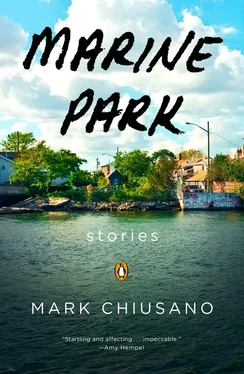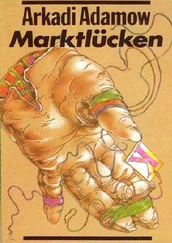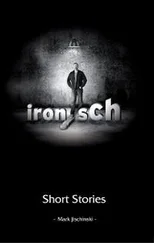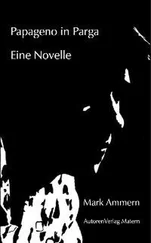We argued. We sat against somebody else’s fence and never made it to dinner. I said that technically the military police could get involved. She said that the second bomb had shattered the trees rather than blowing them over. I told her she had an obligation to her country and her brother, a Marine in the Fifth. She said there were shadows of spiral staircases on walls where the staircases were gone. That the Enola Gay flew through a late moon in the east. That there were eight ships in Hiroshima Harbor. That she hadn’t slept since somewhere over the Pacific. I stopped her and touched her hand and asked if she remembered the night of Trinity, and she sneered, I hardly remember. Really? I said. Grow up, she said, and I slammed my hand through the fence. She got up and walked away slowly while some mother came out and started to squawk.
It took a week for her clearance to be revoked, and for all the papers to come in for her statements to be signed. She ate dinner with me once, but she wouldn’t dance afterward. She stayed inside with a handful of other scientists who were leaving while we toasted, in the middle of the street, next to the pagoda the Army Corps had just finished installing. We went for walks and sat on the bench in the dugout when the baseball field was empty, and for a while she was almost like always. But then that Friday she wouldn’t say a word, and she didn’t want me to touch her shoulders. I gave it up. You have to leave some behind.
Two days later she was gone and we got the go-ahead to get the H-bomb up and running. The war was over but the Russians were working on their own Gadget, and it was only a matter of time before this one mattered. Everyone was ecstatic. We worked twelve-hour days, talked only about fusion. I dropped metal from the rooftops to measure the lateral drift. She left and I hated that she had, with all this going on. It started again, the nights in the cantina, the days in underground labs. The military men played baseball, but we had a war on here. Sometimes I caught myself panting in the middle of drafting, and I’d have to take a beaker of bourbon before starting again. I knew guys who had to be hospitalized for refusing to sleep. There was talk of changing our sleep schedules to make a twenty-six-hour day. Day and night became interchangeable. Lise wrote a letter, saying she was somewhere in Arizona and trying to live. I threw it out. I wanted to see it again, the cloud coming over the desert. So loud that the deaf heard something outrageous and the blind asked if this was white. I went into her office, pored over her papers, sat in the plush chair behind her desk. I began to think that she took the answer with her. She knew how it could be done. There was a secret and it was lost to me. She was gone and we were waiting for inspiration to strike.
Because she is not with you, you get off the train, late one night, and you go to the bar. The bar is on Bergen and off Smith Street. You walk past it every day, on your way to the F train. On the way home at night you walk past it again, with the hordes of other people, all in their black jackets and suits, sometimes blue, for the women. You’ve done that walk with her, walked by the bar, though she refuses to wear blue. Sorry, Eamon, she’d say. You almost forgot that. Tonight you go in. It is a late night. The white bartender, as you come through the door, gives you the look that he gives to desperate people. We just had last call, he says. Can I get a drink? you say. I’m sorry, says the bartender. Just one, you say, as you slide into an empty stool at the bar, facing the newly exposed red brick. The bartender looks over his shoulder, and then he looks at the door, where a man has just entered, maybe Hispanic, a man who at first looks worn and weather-beaten and then you realize it’s just the coat he has on, and the style with which he holds his shoulders. Other than that he is a young man, your age, maybe, no more. The bartender leans close to you and says, Just one. I don’t want to create a rush. That’s fine, you tell him, as the man settles into the seat next to yours. I’ll have the pale ale, you tell him, and you do.
You sip the pale ale like you’ve never had a drink before, as if it were a religious ceremony. You look at the exposed brick walls. You still have your hood on, and your collar turned up, on the black coat you are wearing.
The bartender comes up to the man sitting next to you and his friends. Otro? he asks. Nada más, says the man, and the bartender says, No te preocupas. You snort, to show you’ve understood it, and because you have, the man sitting next to you says, You speak Spanish?
And you say, Solo un poco.
And he says, That’s good, that’s good.
And you say, De dónde son ustedes?
And he answers once again in English. From Arizona, he says. Pointing at the young man next to him, he says, Miami. And then the attractive woman at the end of the bar. Guatemala. She nods.
And you? the Arizona man says, in the English version of the y tu that you would have understood.
I’m from here, you say — from Brooklyn. Marine Park. Down that way. You point in a vague southerly direction.
Arizona looks surprised.
I’ve never met anyone who’s actually from here before.
You laugh and consider bringing up the E. B. White line that’s on the subway posters, but instead you just say, That’s the way it is.
It’s different from here, down there, you say. He nods. But not so different. There are more things to do in this part. He nods again.
Many things to do here, he says. Many restaurants.
Lots of restaurants, you say. Lots of exposed brick, you add, pointing at the walls. They used to be covered with plaster, you say, as if you know. The woman from Guatemala leans over and says, Plaster? And suddenly you are very tired. Yes, you say, and leave it at that.
You drink more of your pale ale and the two men and woman go back to speaking to each other in low tones in Spanish. The bartender walks out from behind the bar, which is still crowded, and goes out the door. You decide not to look at your cell phone. When the bartender comes back into his bar, he walks by the man from Arizona, and slips a wad of napkins into his coat pocket, his coat still on. There is the smell, suddenly, that overcomes you, like wet earth, like lying on the grass somewhere with trees. The man from Arizona looks at you. You look at him.
It’s OK, you say. You’re among friends.
Can you smell it? he asks.
Sure, you say.
You need a ziplock bag, his companion says. Do you have a ziplock bag? he asks you.
I don’t, you say. But it’s fine. I can only smell it because I’m so close, you add. He closes his jacket more and grins at you. David, he says, and extends his hand. You shake it. You tell him your name. We’re waiters, he says. But we have money. We live in Carroll Gardens. Me and Andreo. Isabella is in Brooklyn Heights. But Isabella has already stopped paying attention to you and her fellow workers, and is busy looking at her cell phone.
What restaurant? you say. Is it one I might have been to?
Maybe, they say, and they name a restaurant on Smith Street that you have never been to. You never eat in restaurants alone.
I know it, you say. A nice place. A good place.
They nod noncommittally. Yes, David says, but not like Arizona. Andreo agrees.
What do you mean? you say.
No tipping like Arizona, he says. In Arizona they tip 40 percent.
Forty percent, you say, too loud, as if you might have been outraged.
Yes, David says. It is common.
And how about here? you ask.
David thinks for a minute, swilling the wine that is left in his glass. Ten, fifteen. Sometimes twenty, he says. Sometimes five. Sometimes point oh-oh-oh-oh-oh-one percent.
Читать дальше











